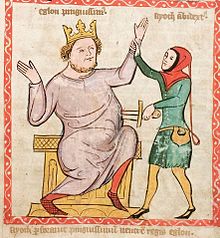This day in history: Edmund Ironside, King of England, was stabbed while sitting on the toilet, by an assassin hiding underneath on this day in 1016.
Sitting on the toilet leaves one vulnerable, so it makes sense that in the past, some have used this private time to kill the inhabitants of "the throne." One of the first of such assassinations is recorded in the Bible at Judges chapter 3 when Ehud kills King Eglon while he was sitting on the chamber.*
On November 4 1035, Jaromír, Duke of Bohemia, was stabbed with a spear from under a toilet seat while defecating.
Godfrey the Hunchback, Duke of Lower Lorraine (an area roughly coinciding with the Netherlands and Belgium) was murdered in 1069 when staying in the Dutch city of Vlaardingen. Supposedly, the assassin made sure which of the latrines, which were built and drained on the outer side of the wall, according to medieval building style, belonged to the duke's sleeping room, and took a position underneath. Some sources say that a sword was used for the assassination; others mention a sharp iron weapon, which could have been a sword but also a spear or a dagger, but a spear seems to be the most practical choice. After being stabbed in the bottom it took him several days to die. The assassination was ordered by Dirk V Count of Holland and his ally Robrecht the Frisian, Count of Flanders.
Godfrey IV, Duke of Lower Lorraine, was assassinated by a spear in Vlaardingen (Netherlands) while "answering the call of nature" in 1076.
On August 4, 1306, Wenceslaus III of Bohemia, was murdered with a spear while sitting in the garderobe (castle toilet). His assassin was never identified.
Japanese ruler Uesugi Kenshin was allegedly assassinated while using a toilet in 1578.
Historian Ioan P. Culianu was shot dead while on the toilet in the third-floor men's room of Swift Hall on the campus of the University of Chicago on 21 May 1991, in a possibly politically-motivated assassination. His killer has never been caught.
*The Hebrew for the location of the private meeting is ba-aliyat ha-meqerah, translated as cooling roof chamber, which was likely a bathroom given that the servants believed Eglon was relieving himself (v24). Ehud said, "I have a message from God for you", drew his sword, and stabbed the king in his abdomen. The Hebrew word for abdomen (beten), is the same word that is used for the womb of a woman. After Ehud stabbed the king, the end of Judges 3:22 reads in Hebrew wa-yese ha-paršedonah usually translated as “and the dirt came out,” a phrase of uncertain meaning as it is only used once in the Hebrew Bible. “Dirt” could be translated as feces.



No comments:
Post a Comment